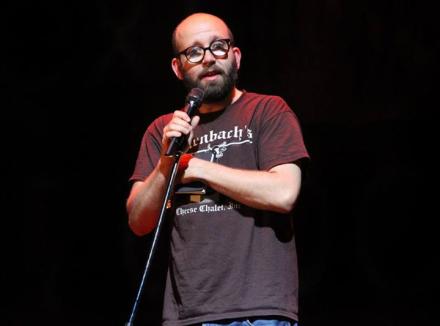
There has been a lot of coverage in the past few days about the comedy club in Barcelona where they are trying out a pay-per-laugh policy. There are a few things that bother me about this. Apart form the fact that I have no earthly idea how it is going to work. Presumably some kind of camera has to be trained on the face? What if the comedy fan is wearing a niqab?
And incidentally, from what I can see from their website, the venue where this mechanism has been installed – teatreneu – is not a comedy club as British stand-up fans would understand it. It looks more like a fringe theatre with maybe a bit of impro. It is an indication of how the press find comedy so marketable and sexy that they have made this sound like Spain's very own Comedy Store. I can’t really see this happening in London, but then I'm a critic. I'm not in marketing. I've also heard that this is not a long-term policy, just an advertising gimmick. Let's hope this is true.
What bothers me about this is the reductive nature of the device. That the success of a comedy performance can be measured by how many times your mouth turns upwards. I was thinking about this before I heard about pay-per-laugh. At the start of last week I reviewed the Laughing Point gig MC’d by Daniel Kitson (pictured at the gig). So did the Daily Telegraph, but on their website the Telegraph also ran an ominous piece titled “The Five Best Jokes From Laughing Point” where they quoted gags from the likes of Kitson, Josh Widdicombe, Joe Lycett and Katherine Ryan.
Now there is already an ongoing heated dialogue about both the future of arts criticism and whether gags should be quoted in reviews. The defence of the latter is usually that this is done in context and gives a flavour of a performance. In the Telegraph's list the gags are presented naked and full-frontal, not dressed up in lovely fancy sentences as part of a critique. I wonder how the acts here felt about it. And did they feel better or worse than the other acts, including Tony Law or Stewart Lee, whose zingers were overlooked? As Oscar Wilde said, it’s better to have your jokes given away online than to be ignored. Or something.
I’ve been troubled by the idea of comedy being reduced to a simple pseudo-scientific process for a few years now. I once judged a comedy competition and one of the judges next to me simply put a tick by each entrant’s name every time they made him laugh. The one with the most ticks at the end of the night was his winner. I’m not saying their choice wasn’t funny, but is that really the best way to judge who is the best comedian?



